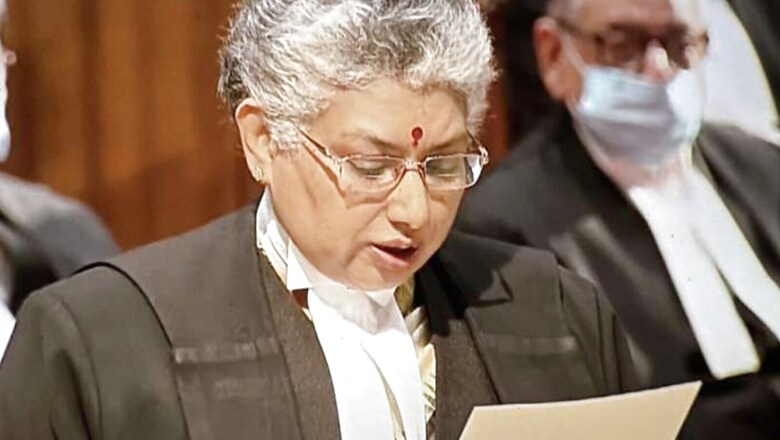
views
Supreme Court’s Justice BV Nagarathna penned two crucial dissenting opinions in the first week of 2023. One pertains to the case where the SC upheld the procedural propriety around the demonetisation process. The second is the case where the top court dealt with questions around hate speech and whether MPs, MLAs, and ministers should have some higher accountability. Justice Nagarathna dissented from the majority in both these judgments in whole, and in part, respectively.
The judge argued that for demonetisation of 2016, the government ought to have brought in legislation, while in the case of controversial statements by politicians, she highlighted the need for greater propriety and accountability. Mincing no words, she argued how hate speech strikes at the heart of constitutional values.
Compliance and agreement with the majority have their own security and comfort. That’s not to say it’s devoid of merit. But dissent has a special place. Dissent must be celebrated not because it seems to be woke or in vogue, but because its very existence points to a thriving culture of dialogue and diversity of opinion. Moreover, dissent from a judge who is all set to be the first woman Chief Justice of India has special importance. And when women who are trailblazers, who smash the glass ceilings dissent, they claim their own space in institutions that have been male bastions.
“Behind every successful man stands a great woman”— so goes an old saying. Yet little attention has been paid to the lives of the women who stood behind the justices, writes Ruth Bader Ginsburg in the book My Own Words. She highlights how women have been pillars behind the great judges (as their spouses) at the US Supreme Court, yet their labour and contribution have never been documented.
For far too long, women in the judiciary, like many other professions, have been behind the curtains. Toiling and contributing through their silent labour, building individuals and institutions brick by brick with their sweat and blood. So, every woman judge on the bench and every woman lawyer at the bar who choose to voice their dissent, a diverse argument, or a divergent view from the majority is an occasion to celebrate. Hence, Justice Nagarathna’s dissent is one to take serious note of for the times to come.
Celebrating or condemning judicial pronouncements on their merit is a slippery slope. You clap for the court, or the judge concerned when it suits you, or your political narrative. Or you may call the judiciary a den of nepotism, ridden with flaws when it doesn’t suit your political inclination or your views. The fidelity to pure law is rare and missing from the discourse. So, while the opponents of the government would cling to the dissent in demonetisation and hail the judge for “taking on the government”, Justice Nagarathna has penned a judgement which is an argument for procedural propriety. The cheerleaders would vanish the moment any order from the judge seems to “favour” the government.
My argument today is of pure dissent. Dissents from Justice Nagarathna seem to echo constitutional concerns around procedure and propriety. And if history is anything to go by, reform and change are transcribed in the tone of dissent —whether it’s at the dining tables of our homes or in the judicial pronouncement of the Supreme Court. Justice Ginsburg wanted to be a “diva”, as she loved opera. She was indeed one, in a different way though. A country like India, on the cusp of change and transformation, certainly needs more dissent from its “divas”.
Read all the Latest India News here




















Comments
0 comment